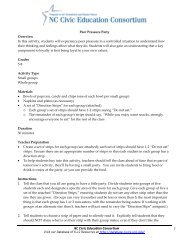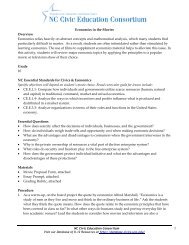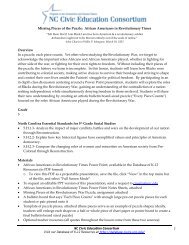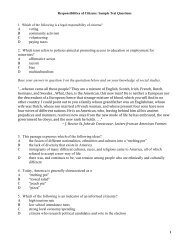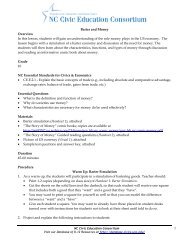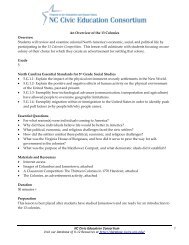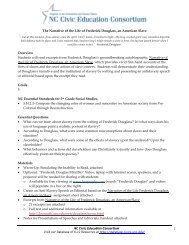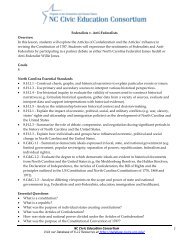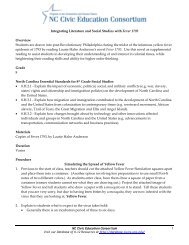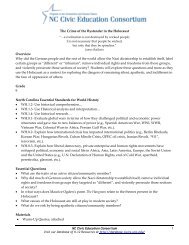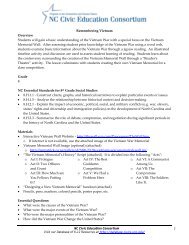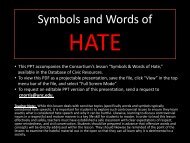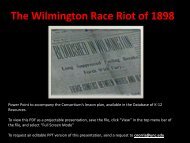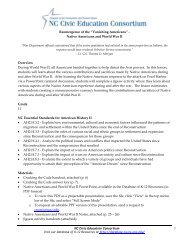American Abolitionists - Database of K-12 Resources
American Abolitionists - Database of K-12 Resources
American Abolitionists - Database of K-12 Resources
You also want an ePaper? Increase the reach of your titles
YUMPU automatically turns print PDFs into web optimized ePapers that Google loves.
Wendell Phillips<br />
Wendell Phillips (1811‐1884) was one <strong>of</strong> the abolitionist movement’s most<br />
powerful orators. The Harvard‐educated lawyer came from a wealthy and<br />
influential Boston family, many <strong>of</strong> whom were appalled by his activism in<br />
support <strong>of</strong> the abolitionist cause. However, he was undaunted in his work and<br />
was thrust into prominence when he gave a riveting speech in Boston’s<br />
Faneuil Hall in defense <strong>of</strong> Elijah Lovejoy in 1837. The Rev. Lovejoy had been<br />
murdered for his repeated attempts to run a printing press sympathetic to the<br />
abolitionist cause. Phillips used plain, yet metaphorical language to convey his message. He<br />
also gave generously to abolitionists in need <strong>of</strong> financial assistance.<br />
‐‐‐‐‐‐‐‐‐‐‐‐‐‐‐‐‐‐‐‐‐‐‐‐‐‐‐‐‐‐‐‐‐‐‐‐‐‐‐‐‐‐‐‐‐‐‐‐‐‐‐‐‐‐‐‐‐‐‐‐‐‐‐‐‐‐‐‐‐‐‐‐‐‐‐‐‐‐‐‐‐‐‐‐‐‐‐‐‐‐‐‐‐‐‐‐‐‐‐‐‐‐‐‐‐‐‐‐‐‐‐‐‐‐‐‐‐‐‐‐‐‐‐‐<br />
Lucretia Mott<br />
Lucretia Mott (1793‐1880) was a Quaker and a “non‐resistant” pacifist who<br />
was committed to black emancipation and women’s rights. As a woman,<br />
her role in <strong>of</strong>ficial abolitionist movements was fraught with difficulties. In<br />
1840, she and six other <strong>American</strong> female delegates to the World Anti‐<br />
Slavery Convention in England were refused seats. Because <strong>of</strong> her<br />
opposition to violence <strong>of</strong> any kind, Mott did not support the Civil War as a<br />
means <strong>of</strong> liberating slaves. She did, however, welcome the War’s hastening <strong>of</strong> emancipation.<br />
Of her principles she wrote, “I have no idea, because I am a non‐resistant, <strong>of</strong> submitting<br />
tamely to injustice inflicted either on me or on the slave. I will oppose it with all the moral<br />
powers with which I am endowed. I am no advocate <strong>of</strong> passivity.”<br />
‐‐‐‐‐‐‐‐‐‐‐‐‐‐‐‐‐‐‐‐‐‐‐‐‐‐‐‐‐‐‐‐‐‐‐‐‐‐‐‐‐‐‐‐‐‐‐‐‐‐‐‐‐‐‐‐‐‐‐‐‐‐‐‐‐‐‐‐‐‐‐‐‐‐‐‐‐‐‐‐‐‐‐‐‐‐‐‐‐‐‐‐‐‐‐‐‐‐‐‐‐‐‐‐‐‐‐‐‐‐‐‐‐‐‐‐‐‐‐‐‐‐‐‐<br />
Lydia Maria Child<br />
Novelist, scholar, and activist for women’s rights, Lydia Maria Child (1802‐<br />
1880) became an abolitionist after she began reading Garrison’s news journal,<br />
The Liberator. In 1833, Child wrote “An Appeal to that Class <strong>of</strong> <strong>American</strong>s<br />
Called Africans,” an anti‐slavery tract in which she declared her willingness to<br />
battle for emancipation. Her new abolitionist rhetoric so repelled readers that<br />
Childʹs books sold poorly, and she could not find a publisher willing to accept<br />
her work. From 1841‐43, Child was the editor <strong>of</strong> the National Anti‐Slavery<br />
Standard, the <strong>American</strong> Anti‐Slavery Society’s newspaper. She later resigned because <strong>of</strong><br />
infighting among the societyʹs members, who were divided in their support for the diverging<br />
philosophies, “moral suasion” and political persuasion. Child revitalized her role as an<br />
opponent <strong>of</strong> slavery after the passage <strong>of</strong> the Fugitive Slave Law in 1850 and John Brown’s<br />
raid on Harper’s Ferry in 1859. She continued publishing letters, edited Harriet Jacob’s<br />
Incidents in the Life <strong>of</strong> a Slave Girl, and wrote primers and anti‐slavery tracts to combat racial<br />
injustice.<br />
NC Civic Education Consortium 16<br />
Visit our <strong>Database</strong> <strong>of</strong> K-<strong>12</strong> <strong>Resources</strong> at http://database.civics.unc.edu/



